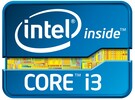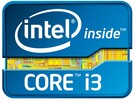Intel Core i3-2365M vs Intel Core i5-2410M vs Intel Core i3-2328M
Intel Core i3-2365M
► remove from comparison
Der Intel Core i3-2365M ist ein stromsparender ULV (Ultra Low Voltage) Prozessor für Subnotebooks. Mit 1.4 GHz Taktfrequenz ist er relativ gering getaktet und bietet keine automatische Übertaktung mit Turbo Boost 2.0. Durch die Unterstützung von Hyperthreading können 4 Threads gleichzeitig bearbeitet werden. Im Vergleich zu den teureren Modellen, bietet der i3 kein VT-d, Trusted Execution, AES oder vPro. Bis auf den Small Business Advantage (SBA) Support (nötig für das Ultrabook Logo) identisch mit dem Core i3-2367M.
Sandy Bridge ist eine Weiterentwicklung der Arrandale Architektur. Neben Optimierungen sind besonders die neuen 256 Bit AVX Instruktionen im CPU Teil und der verbesserte Turbo 2.0 erwähnenswert (der jedoch im CPU Teil des i3-2365M nicht zum Einsatz kommt). Weiters ist ein verbesserter Dual Channel DDR3 Speicherkontroller für max. 16 GB DDR3-1333MHz direkt im Prozessor integriert.
Die intergrierte DirectX 10 fähige Intel HD Graphics 3000 Grafikkarte ist direkt in der CPU untergebracht und teilt sich mit dieser den Level 3 / Last Level Cache. Dadurch sinkt zwar die Prozessorleistung etwas bei aktivierter Grafik, die Grafikleistung ist jedoch deutlich besser als bei der alten Intel HD Graphics in ULV Notebooks. Vergleichen mit den stärkeren 35 Watt Doppelkernprozessoren ist die Grafikleistung jedoch aufgrund der geringeren Taktfrequenz deutlich schlechter (350 versus 650 MHz Basistakt, 1000 versus 1100-1300 MHz Turbo Boost).
Die Performance liegt dank der verbesserten Architektur und des überarbeiteten Turbo Boost etwas oberhalb einer ähnlich getakteten Arrandale CPU und damit deutlich über dem alten Core i3-380UM mit 1.33GHz. Die durchschnittliche Performance sollte daher auf dem Niveau eines AMD A4-3300M liegen (nur Prozessorleistung). Sehen sie auch auf die Seite des praktisch baugleichen Core i3-2367M für Benchmarks.
Die Sandy Bridge Doppelkernprozessoren beinhalten im angegebenen TDP von 17 Watt auch die Grafikkarte und den Speicherkontroller und eignen sich damit auch für kleine und leichte Notebooks.
Intel Core i5-2410M
► remove from comparison
The Intel Core i5-2410M is a fast dual core processor at the time of introduction in Q1 2011. It is based on the Sandy Bridge architecture and offers Hyperthreading to handle 4 threads at once (for a better usage of the pipeline). Compared to the faster Core i7, the i5 offers a smaller last level cache of 3MB. The base clock speed is 2.3 GHz but due to Turbo Boost it can reach 2.6 GHz (2 cores active) and 2.9 GHz (1 core active). Compared to the 2510M, the 2410M does not support AES, VT-d, and Trusted Execution functions.
Sandy Bridge is the evolutionary successor of the Arrandale architecture. The most noteable improvements is the improved Turbo 2.0 and the integration of the graphics card into the 32nm CPU core.
The i5-2410M offers an integrated graphics card (Intel HD Graphics 3000) which is clearly faster then the older Intel HD Graphics in the Arrandale CPUs. As the new GPU is included in the CPU, it is also manufactured in 32nm and shares the fast level 3 cache with the CPU cores (using a new ring bus). In the 2410M it is clocked from 650-1200MHz (with Turbo Boost). The faster Sandy Bridge CPUs are clocked up to 1300 MHz (like the i5-2520M).
Furthermore, an improved dual-channel DDR3 memory controller is included on the CPU die that is used by the CPU and GPU part.
Due to the improved architecture and the new Turbo Boost 2.0, the average performance of the Core i5-2410M is higher than a similar clocked Arrandale Core i5. In our benchmarks, the 2410M was able to beat the fast Intel Core i5-560M with 2.7-3.2GHz and is therefore suited for even demanding tasks.
The 35W TDP rating includes the integrated GPU and memory controller.
Intel Core i3-2328M
► remove from comparison
Der Intel Core i3-2328M ist ein Mittelklasse Doppelkernprozessor für Notebooks welcher im September 2012 vorgestellt wurde. Er bietet zwei Kerne und kann dank Hyperthreading 4 Threads gleichzeitig bearbeiten. Im Vergleich zu den i5 und i7 Doppelkernprozessoren, bietet der i3-2328M keinen Turbo Boost zum automatischen übertakten des Prozessors (jedoch für die integrierte Grafikkarte). Auch VT-d, Trusted Execution und AES sind deaktiviert (wie beim i5-2410M). Der Core i3-2328M entspricht weitgehenst dem Core i3-2330M, bietet jedoch laut CPU World keine Unterstützung für Intel's Small Business Advantage Tools (USB Blocker, PC Health Check, Data Backup und Wireless Display).
Sandy Bridge ist eine Weiterentwicklung der Arrandale Architektur. Neben Optimierungen sind besonders die neuen 256 Bit AVX Instruktionen im CPU Teil und der verbesserte Turbo 2.0 erwähnenswert. Dieser kommt beim i3-2310M jedoch nur für die Grafikkarte zum Einsatz. Weiters ist ein verbesserter Dual Channel DDR3 Speicherkontroller für max. 8 GB DDR-1333MHz direkt im Prozessor integriert.
Die intergrierte DirectX 10 fähige Intel HD Graphics 3000 Grafikkarte ist direkt in der CPU untergebracht und teilt sich mit dieser den Level 3 / Last Level Cache. Dadurch sinkt zwar die Prozessorleistung etwas bei aktivierter Grafik, die Grafikleistung ist jedoch deutlich besser als bei der alten Intel HD Graphics und auf Niveau einer Nvidia Geforce 310M Einstiegsgrafikkarte. Dank Turbo Boost wird sie wie beim 2310M von 650MHz bis 1100MHz getaktet.
Die Performance liegt dank der verbesserten Architektur etwas oberhalb einer ähnlich getakteten Arrandale CPU. Im Schnitt liegt der Core i3 deshalb auf dem Level eines 2.53 GHz Core i3-380M. Für die meisten Anwendungen sollte die Performance dadurch ausreichen.
Die Sandy Bridge Doppelkernprozessoren beinhalten im angegebenen TDP von 35 Watt auch die Grafikkarte und den Speicherkontroller. Mit 35W TDP eignet sich der Prozessor am besten für 14" Notebooks und größer.
| Model | Intel Core i3-2365M | Intel Core i5-2410M | Intel Core i3-2328M | ||||||||||||||||||||||||||||||||||||||||||||||||||||||||||||||||||||||||||||||||||||||||||||||||||||||||||||||||||||||||||||||||||||||||||||||||
| Series | Intel Core i3 | Intel Core i5 | Intel Core i3 | ||||||||||||||||||||||||||||||||||||||||||||||||||||||||||||||||||||||||||||||||||||||||||||||||||||||||||||||||||||||||||||||||||||||||||||||||
| Codename | Sandy Bridge | Sandy Bridge | Sandy Bridge | ||||||||||||||||||||||||||||||||||||||||||||||||||||||||||||||||||||||||||||||||||||||||||||||||||||||||||||||||||||||||||||||||||||||||||||||||
| Serie: Core i3 Sandy Bridge |
|
|
| ||||||||||||||||||||||||||||||||||||||||||||||||||||||||||||||||||||||||||||||||||||||||||||||||||||||||||||||||||||||||||||||||||||||||||||||||
| Clock | 1400 MHz | 2300 - 2900 MHz | 2200 MHz | ||||||||||||||||||||||||||||||||||||||||||||||||||||||||||||||||||||||||||||||||||||||||||||||||||||||||||||||||||||||||||||||||||||||||||||||||
| L1 Cache | 128 KB | 128 KB | 128 KB | ||||||||||||||||||||||||||||||||||||||||||||||||||||||||||||||||||||||||||||||||||||||||||||||||||||||||||||||||||||||||||||||||||||||||||||||||
| L2 Cache | 512 KB | 512 KB | 512 KB | ||||||||||||||||||||||||||||||||||||||||||||||||||||||||||||||||||||||||||||||||||||||||||||||||||||||||||||||||||||||||||||||||||||||||||||||||
| L3 Cache | 3 MB | 3 MB | 3 MB | ||||||||||||||||||||||||||||||||||||||||||||||||||||||||||||||||||||||||||||||||||||||||||||||||||||||||||||||||||||||||||||||||||||||||||||||||
| Cores / Threads | 2 / 4 | 2 / 4 | 2 / 4 | ||||||||||||||||||||||||||||||||||||||||||||||||||||||||||||||||||||||||||||||||||||||||||||||||||||||||||||||||||||||||||||||||||||||||||||||||
| TDP | 17 Watt | 35 Watt | 35 Watt | ||||||||||||||||||||||||||||||||||||||||||||||||||||||||||||||||||||||||||||||||||||||||||||||||||||||||||||||||||||||||||||||||||||||||||||||||
| Transistors | 624 Million | 624 Million | 624 Million | ||||||||||||||||||||||||||||||||||||||||||||||||||||||||||||||||||||||||||||||||||||||||||||||||||||||||||||||||||||||||||||||||||||||||||||||||
| Technology | 32 nm | 32 nm | 32 nm | ||||||||||||||||||||||||||||||||||||||||||||||||||||||||||||||||||||||||||||||||||||||||||||||||||||||||||||||||||||||||||||||||||||||||||||||||
| Die Size | 149 mm2 | 149 mm2 | 149 mm2 | ||||||||||||||||||||||||||||||||||||||||||||||||||||||||||||||||||||||||||||||||||||||||||||||||||||||||||||||||||||||||||||||||||||||||||||||||
| max. Temp. | 100 °C | 100 °C | |||||||||||||||||||||||||||||||||||||||||||||||||||||||||||||||||||||||||||||||||||||||||||||||||||||||||||||||||||||||||||||||||||||||||||||||||
| Socket | FCBGA1023 | rPGA988B / BGA1023 | |||||||||||||||||||||||||||||||||||||||||||||||||||||||||||||||||||||||||||||||||||||||||||||||||||||||||||||||||||||||||||||||||||||||||||||||||
| Features | HD Graphics 3000 (350-1000MHz), DDR3-1066/1333 Memory Controller (max 8GB), HyperThreading, AVX, Quick Sync, Virtualization | HD Graphics 3000 (650-1200MHz), DDR3-1066/1333 Memory Controller (max 16GB), HyperThreading, AVX, Quick Sync, Virtualization | HD Graphics 3000 (650-1100MHz), DDR3-1066/1333 Memory Controller (max 8GB), HyperThreading, AVX, Quick Sync, Virtualization | ||||||||||||||||||||||||||||||||||||||||||||||||||||||||||||||||||||||||||||||||||||||||||||||||||||||||||||||||||||||||||||||||||||||||||||||||
| iGPU | Intel HD Graphics 3000 (350 - 1000 MHz) | Intel HD Graphics 3000 (650 - 1200 MHz) | Intel HD Graphics 3000 (650 - 1100 MHz) | ||||||||||||||||||||||||||||||||||||||||||||||||||||||||||||||||||||||||||||||||||||||||||||||||||||||||||||||||||||||||||||||||||||||||||||||||
| Architecture | x86 | x86 | x86 | ||||||||||||||||||||||||||||||||||||||||||||||||||||||||||||||||||||||||||||||||||||||||||||||||||||||||||||||||||||||||||||||||||||||||||||||||
| Announced | |||||||||||||||||||||||||||||||||||||||||||||||||||||||||||||||||||||||||||||||||||||||||||||||||||||||||||||||||||||||||||||||||||||||||||||||||||
| Manufacturer | ark.intel.com | ark.intel.com |


 Deutsch
Deutsch English
English Español
Español Français
Français Italiano
Italiano Nederlands
Nederlands Polski
Polski Português
Português Русский
Русский Türkçe
Türkçe Svenska
Svenska Chinese
Chinese Magyar
Magyar
